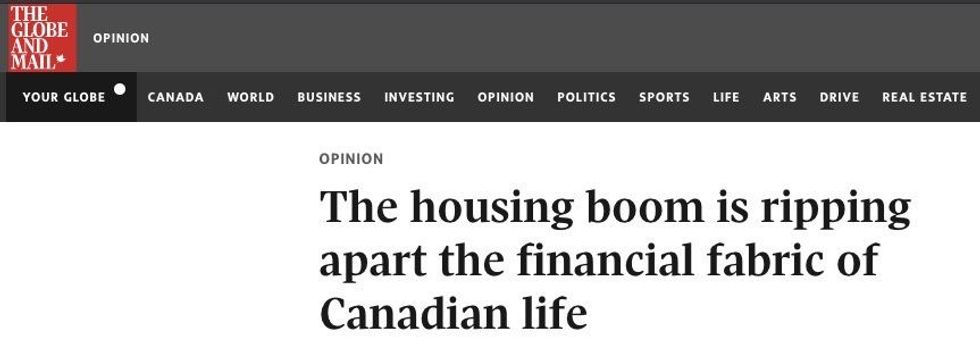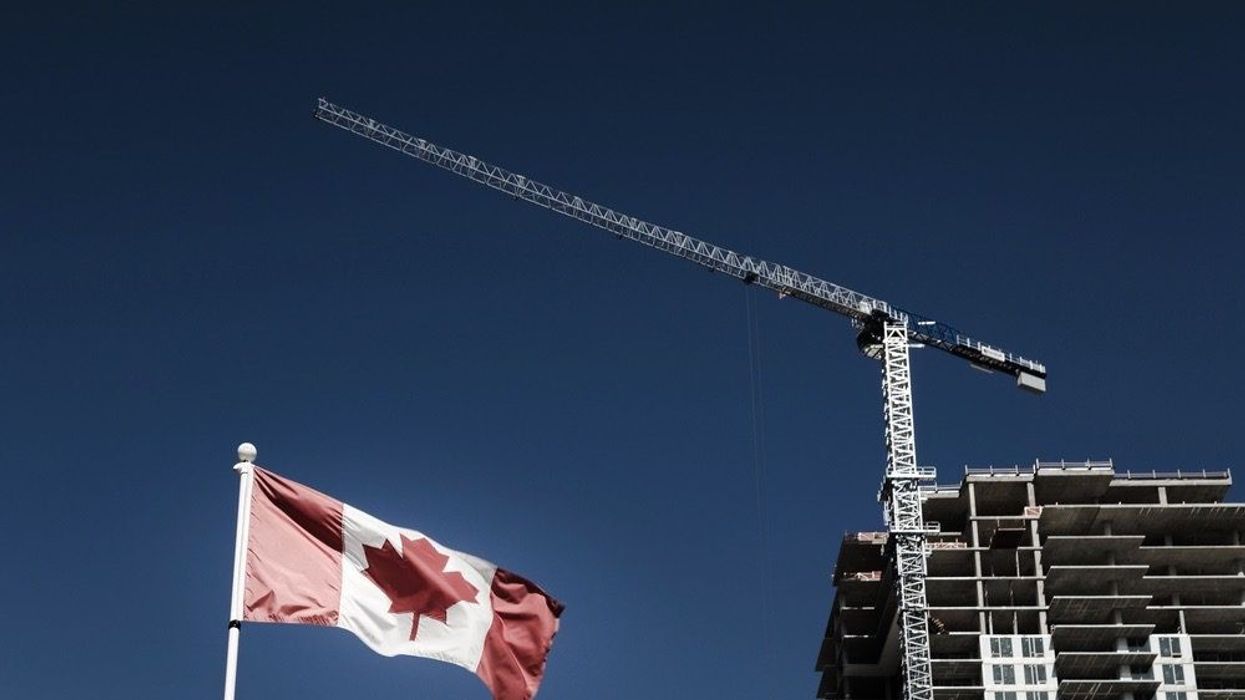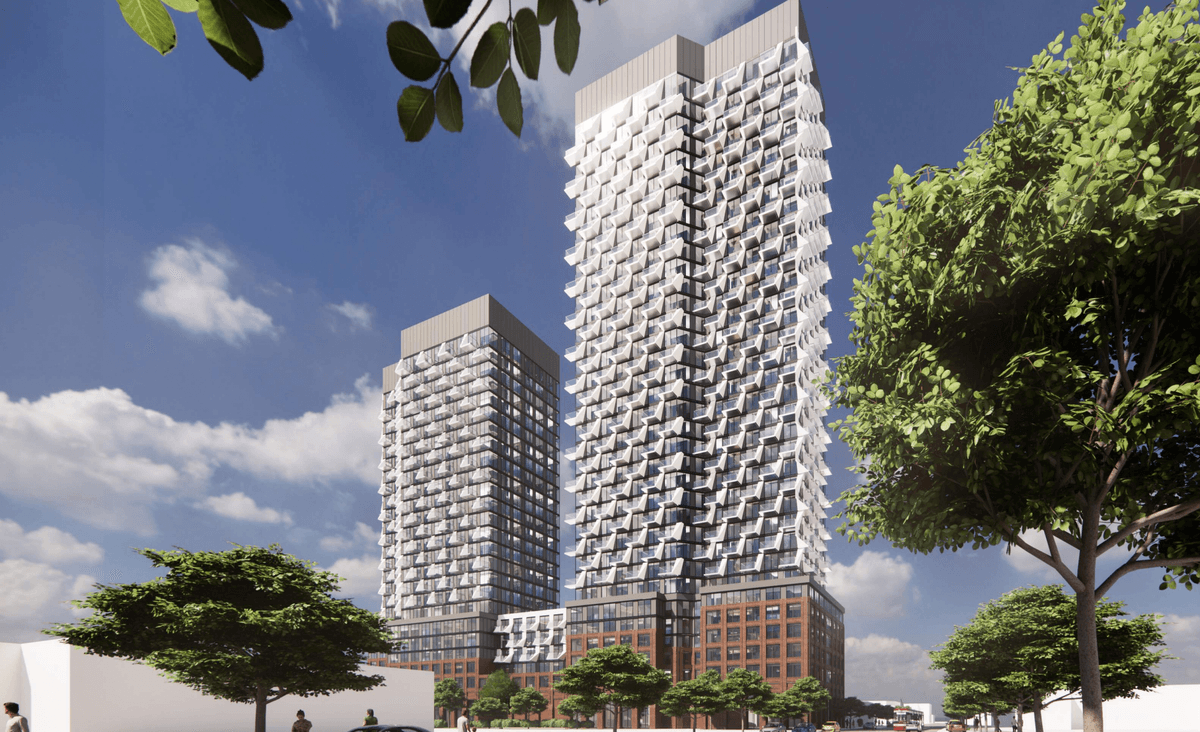You’d be forgiven for thinking the housing market was fundamentally risky, unstable, and poised to collapse -- a dangerous bubble waiting for its inevitable bust.
Media coverage has breathlessly followed the industry’s record-breaking stats and the unexpected pandemic frenzy, with fairly regular references to an upcoming financial crisis.
But according to some experts and industry players, a collapse is far from guaranteed -- and headlines are sometimes hysterical.
“They all are feeding from Bloomberg News,” says Murtaza Haider, professor at Ryerson University’s Ted Rogers School of Management, research director at the Urban Analytics Institute and Haider-Moranis Bulletin columnist for The Financial Post.
“Bloomberg said, ‘We have run our economic model and we have found that Canada is one of the frothiest markets.’ And they use metrics that make no sense to me. They say the price-to-income ratios have increased significantly. And the question is: Are we buying coffees? Because we pay cash for coffee -- so price matters. Are we buying clothes? Because we pay cash for clothes -- so price matters. But housing is bought on credit. And credit is the cheapest it has ever been in the last 50, 100 years because the interest rates are so low.”

Other elements play into dire headlines, Haider says: negative news may take precedence over positive; bewildering price increases are rippling throughout the GTHA and beyond; some players may have a financial interest in a pricing collapse; a general sense that growth cannot be sustainable.
“It’s quite interesting that the news media is fixated with the idea that there will be a market crash,” Haider says. “We have been told that what goes up must come down, right? So they say, prices are going up, they will come down. So this notion is there.”
The simple realities of supply and demand are being underestimated when an inevitable bust is forecasted, says Sri Thanabalasingam, senior economist at TD Economics.
Toronto is still a hotspot for immigration, international students and inward migration, and homeownership is still desirable, he says -- there are no signs these will change. And supply has been tight for years.

“If you look at the conditions that are in place right now -- construction is occurring, but inventory levels are very, very low,” Thanabalasingam says. “And then at the same time, you have the COVID situation improving, possibly a reopening of borders, which will then lend itself to strong population growth again. So you have robust demand, and pretty tight supplies -- that would suggest to me that prices would remain elevated instead of steeply declining.”
So is it possible there will be no bust? No collapse of prices?
“I do believe that’s possible,” Thanabalasingam says.
“Absolutely,” Haider says. “I’m not saying that the markets will not collapse ever, but I don’t see that happening anytime soon.”
‘It’s About Understanding Our Industry'
Last year, with the pandemic in full swing and record job losses across the country, RE/MAX jumped into headlines with a curious clapback -- it accused Canada’s national housing body of “fear-mongering.”
The Canadian Mortgage and Housing Corporation (CMHC) had warned of a decline in Canadian house prices, even as much as 18% over the 12 months following the onset of COVID-19.
Realtors have an obvious stake in keeping Canadians happily buying and selling -- but they’re also on the frontlines, says David Oikle, president of the Ontario Real Estate Association (OREA).
“Realtors have to have an understanding of what's happening in the marketplace,” he says. “It’s not just about being defensive of our industry, it’s about understanding our industry. And the last 12 months has borne out what [RE/MAX] was saying.”
Oikle runs through the same three economic levers: high demand, low supply, cost of borrowing historically cheap. He expects none of these to change significantly in the near future.
But when experts and industry players disagree, is predicting a housing market crash a juicier headline than a projection for steady growth? Oikle hedges on that.
“I’m not in the media business, and it’s a tough business,” he says. “It might be the headline is sexy, and gets people’s attention because it’s provocative, but hopefully they’ve provided balanced reporting in the body of the story. Because as you can very well tell, I’m very optimistic about the real estate market.”
Just last month Barbara Lawlor, CEO of Baker Real Estate Incorporated, called out BlogTO for a misleading headline, using data to refute the claim BlogTO was making that "Hardly anybody is buying condos in downtown Toronto anymore."

Industry leaders are getting more involved when it comes to trying to speak to the longterm issues affecting the housing crisis in Canada.
"I think headlines sell newspapers, but I also think [media] need to take more of an active role in talking to developers and sales companies to... get a sense of what's really happening on the ground," says Riz Dhanji, Founder and President of RAD Marketing.
"They need to speak to more than a single realtor saying 'it’s been slow this month'. They need more than just month-to-month anecdotal evidence."
Dhanji sees larger trends in the housing market being ignored in favour of flashy headlines. "The real issues about affordability in the GTA, what we as an industry and what the media can do to get more affordable housing," is where he believes everyone should be placing more focus.
Jason Mercer, meanwhile, the Toronto Regional Real Estate Board's chief market analyst, recently predicted the biggest year in market history for GTA home sales -- in fact revising an earlier sales forecast to be even stronger.
It’s not possible to characterize media coverage as a whole, Mercer says: “Like anything else, there’s good and bad.”
If anything, sometimes a trend is reported without full context and nuance, Mercer says. City dwellers fleeing for the burbs and beyond? Some articles fixated on the pandemic as a cause, but Mercer points out buyers have been chasing housing availability and affordability outside of the GTA since roughly 2015. The pandemic may have been an accelerator, but the demand was well in place.

“Sometimes I’ll see articles and headlines that aren’t really representative of some of the trends,” he says, “and sometimes we'll see very good articles [about] a press release, or a policy paper that may have come out, and the story is well balanced.”
Gale Beeby, former Editor of the New in Homes and Condos section at the Toronto Star, sees it a little bit differently:
"I’ve been a journalist for over 40 years, and this is just more of the same -- this boom and bust stuff... It’s almost like major media outlets hope for a housing bust so they’ll have a big -- bad -- story to cover... It’s almost like they’re running around yelling the sky is falling.”
Beeby, now the Managing Editor for Here with Colin and Justin, believes housing prices will stabilize, but doesn't believe there will be a bust. And yet, she acknowledges that some of the coverage may very well not be up to the authors penning them as much as it is up to their editors.
"I think the reporters in business are probably being told [to write negative stories]. 'We want you to write a story on the housing bust, or the impending housing bust.'"
‘Every Month the Market Was Beating Records’
Severe recessions impact all corners of the economy, Haider says, and housing markets are not immune. It’s possible that during a strong recession, home prices would lose steam.
“But the fact is that since the early 90s, at least in Canada, we haven’t seen a significant decline in housing prices,” Haider says. “What we have seen is a moderate increase in prices, where prices have roughly doubled every 10 years. … I can see for 10 to 15 years, every year, on average, prices increasing from five to seven per cent. That is going to be the case for us.”

Rather than buyers being discouraged by headlines predicting imminent collapse, there appears to be a case of “FOMO” in the market, Thanabalasingam says. And generational wealth -- from property-rich boomer parents, for instance -- can help with down payment requirements.
As for what a crash might actually look like, he says “it’s a difficult question.” (STOREYS tried to answer that question back in May.)
“If something triggers a loss in confidence in terms of the housing market,” Thanabalasingam says, “and it creates a little bit of a jitters among among Canadian homeowners or even investors in the housing market — if that sort of confidence unraveled, then you could see an increase in listings and substantial increase in housing supply, which then leads to a downward decline in home prices. But as of now, it doesn’t seem like Canadian confidence in the housing market has been impacted in any way through the pandemic.”
Gloomy projections may very well continue, however, even amid a blockbuster year and borders opening soon.
“There were lots of people making these forecasts for a downturn in Canada’s real estate market, while every month the market was beating records,” Haider says. “I fail to understand why so many people, so many smart people, keep seeing markets move in a different direction and continue to forecast a collapse, and doom and gloom. I just don’t understand.”
With files from Nina Dragicevic





















